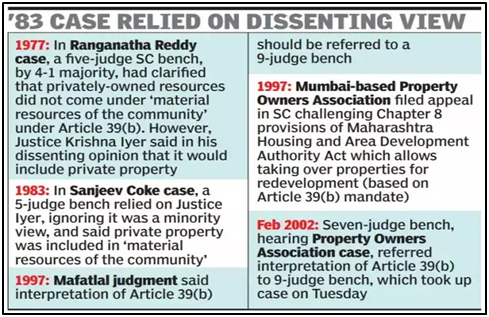Why in News?
As wealth distribution dominates news headlines in India, a nine-judge bench of the Supreme Court commenced the process for interpretation of Article 39(b) of the Indian Constitution.
This to determine whether this directive principle of state policy (DPSP) provision allows the govt to treat and redistribute privately owned properties under the garb of "material resources of the community" for greater common good.
What’s in Today’s Article?
- What is Article 39(b) of the Constitution?
- What are the Different Case Laws Interpreting Article 39(b)?
- Why is the Apex Court Interpreting Article 39(b) Now?
- Why Article 39(b) Needs a 9-Judge Bench Interpretation?
- Views of Advocates on Interpretation of Article 39(b)
What is Article 39(b) of the Constitution?
- It falls under Part IV of the Constitution titled “Directive Principles of State Policy” (DPSP).
- It places an obligation on the state to create policy towards securing the ownership and control of the material resources of the community that are so distributed as best to subserve the common good.
- DPSP are meant to be guiding principles for the enactment of laws, but are not directly enforceable in any court of law.
What are the Different Case Laws Interpreting Article 39(b)?

Why is the Apex Court Interpreting Article 39(b) Now?
- Since 1977, the apex court has weighed in on the interpretation of Article 39(b) on multiple occasions - most notably, in State of Karnataka v Shri Ranganatha Reddy (1977).
- The interpretation by a (9-judges) bench comprising Chief Justice D Y Chandrachud stems from Justice V R Krishna Iyer's dissenting view in Ranganatha Reddy case of 1977.
- According to Justice V R Krishna Iyer, community resources included private properties.
- After subsequent judgements, confusion over this interpretation led to the matter being referred to a nine-judge bench in 2002.
- Though the question is old, it is reverberating in the current politically-surcharged atmosphere after Rahul Gandhi 's promise to conduct a financial and institutional survey.
- This survey will take up the historic assignment to distribute the wealth of India, jobs and other welfare schemes to vulnerable sections based on their population.
Why Article 39(b) Needs a 9-Judge Bench Interpretation?
- CJI explained why Article 39(b) needed to be interpreted by a nine-judge bench.
- The majority in the Ranganatha Reddy case in 1977 clarified that material resources of the community do not include private property.
- However, a five-judge bench in Sanjeev Coke in 1983 relied on Justice Iyer ignoring that it was a minority view.
- In the meantime, SC in Mafatlal Industries case in 1997 opined that Article 39(b) needed interpretation by a nine-judge bench.
Views of Advocates on Interpretation of Article 39(b):
- According to Senior advocates, community resources could never include privately owned properties.
- The advocates termed Justice Iyer's view a reflection of his Marxist socialist ideology which had no place in a democratic country governed by a Constitution giving primacy to fundamental rights of citizens.
- Solicitor general Tushar Mehta said the sole question before the court was interpretation of Article 39(b) and not Article 31C.
- Article 31C provides safe harbour to laws enacted in pursuance of the directive principles.
- Its validity as it existed prior to the 25th constitutional amendment in 1971 has been upheld by a 13-judge bench in Kesavananda Bharti case.
- The bench asked how excess agricultural land was distributed among poor peasants in the 1960s. Replying to this, a senior advocate said -
- No one questioned the state's power to acquire land for public purposes after paying a fair compensation to the owner of the land.
- Land ceiling laws were passed by states to determine excess land accumulated by zamindars and such excess land was then redistributed.
- But if the government wants to take away my property and distribute it to the poor, then I would be left with no money as my fees would be taken away and paid to poor people.









